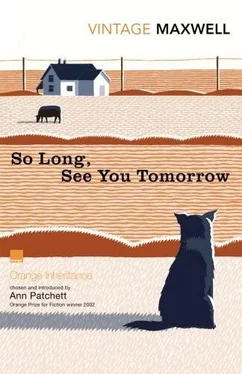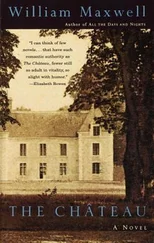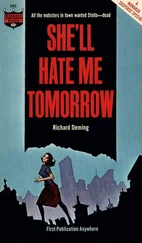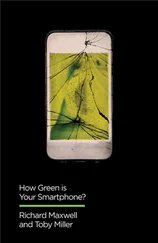At the beginning and end of the album, pasted in what must have been blank places, since they run counter to the sequence, are a dozen pictures of my father. Except for the one where he is standing with a string of fish spread out on a rock beside him, he is always in a group of people. He has a golf stick in his hand. Or he is smoking a pipe. Or he is wearing a bathing suit and has one arm around my stepmother’s waist and the other around a woman I didn’t recognize. And looking at these faded snapshots I see, the child that survives in me sees with a pang that — I am old enough to be that man’s father, and he has been dead for nearly twenty years, and yet it troubles me that he was happy. Why? In some way his happiness was at that time (and forever after, it would seem) a threat to me. It was not the kind of happiness that children are included in, but why should that trouble me now? I do not even begin to understand it.
If I had by some supernatural sleight of hand managed to pull off that trick and brought my mother back from the cemetery and if we had continued to live the way we did before, we would have found ourselves on an island in a river of change, for it was the year 1921, and women had begun to cut off their hair and wear their skirts above their knees and drink gin out of silver flasks in public. Now and then one of them drank too much and had to be taken home. The gossips had a great deal to shake their heads over. In the light of what followed, the twenties seem on the whole a charming, carefree period. So far as good manners are concerned, it was the beginning of the end. When my mother went riding with my father on Sunday morning she rode sidesaddle (think of it!) and came out of the house and down the steps of the front porch in a divided skirt that swept the cement walk. I try to imagine her with bobbed hair and her skirts above her knees and I fail utterly.
It was still possible to think, as my father did, that the present was in every way an improvement over the past, and that the future was bound to be even more satisfactory. He also believed in keeping up with the times. When Prohibition came in, he announced that he was ready to obey the Law and give up drinking — by which he meant a glass of beer or a shot of bourbon, in masculine company. When it turned out that other people were not going to do this, he made his own gin and bought rotgut whiskey from a bootlegger named Goonhound Johnny, like his friends.
On one occasion he even overshot the mark. Friday afternoons I went to dancing school and pushed girls around in the one-step, the fox trot, and the waltz. They held themselves at arm’s length, their backs as stiff as a ramrod, their manner remote. The dancing teacher was young and animated and something under five feet tall, which meant that she was my height even though she wore very high heels. There was also a class for adults on Thursday evenings, to which my father and stepmother went before they were married. One night they put their cheeks together and did a new dance that they had been practicing in private It was called the Toddle, and everybody stopped to look at them, and the dancing teacher, very red in the face, asked them to leave the floor.
It is characteristic of my father that though he was angry at her and never went back, he did not remove me from the children’s class. On Friday afternoon the dancing teacher kept me after the other boys and girls had gone. She was in trouble, though she didn’t quite manage to say what it was. Did she sense that I was half on her side and nobody else much was? She had done the right thing, without stopping to think that the two people involved were of good family and she was a grass widow with two small children to support and from out of town. She may not, in fact, even have known who was and who wasn’t of good family. I felt sorry for her, as I would have for anybody in tears. And disloyal to my father as I stood there listening to the things she said about him. And embarrassed that he was the object of scandal.
One of the things my mother loved about my father was that he was a natural musician. Hoping that this talent might have been inherited, she arranged for my older brother to take piano lessons from a nun who taught music in the Catholic school. When I was six I accompanied him to the house where the nuns lived, for my first music lesson. Sister Mary Anise showed me where to put my hands on the keyboard and I looked up at her teeth, which were frightfully crooked, and burst into tears. She told my brother to bring me back when I was seven — by which time she was wearing false teeth that were not crooked and I could look at her with equanimity. I was not musical and I didn’t like to practice. What I did like was the lives of the composers, doled out to me one at a time in the form of unbound sheets of printed matter that had to be folded and sewed together at the spine, and a perforated sheet of illustrations to be pasted in at the appropriate places. In the first of these books I read how Johann Sebastian Bach’s wicked elder brother was jealous of his talent and wouldn’t let him have access to the music he wanted, so he got up in the night and copied it by moonlight, ruining his eyesight. I found an attachment to the young put-upon Johann Sebastian Bach, and after him to Handel and his Water Music, and Haydn and Mozart and Beethoven and Schubert and Schumann and Mendelssohn and Wagner’s operas and classical music in general. It didn’t improve my playing. “Flat,” my mother would call out from the next room, when I was practicing at home. “E-flat, not E-natural.” And I would get up from the piano stool and go look at the clock in the front hall.
My father kept a small victrola on top of the upright piano in the living roon and after dinner, having played a new record through two or three times while he figured out the chords, he was off, he had it. He played ragtime and songs from the musicals of the period. He had a beautiful touch and people loved to hear him. One day he sat down at the piano with me and tried to teach me how to play by ear. I didn’t understand one word he was saying.
It gave him no pleasure to hear me stumble through “The Shepherd Boy’s Prayer,” and also he wanted me to like his kind of music, so, when I was twelve, without inquiring how I felt about it, he took me away from Sister Mary Anise and Bach and Handel and Haydn, and arranged for me to take lessons from a young married woman who played the organ in the Catholic Church and was my stepmother’s closest friend. The piece she gave me to learn, at my father’s suggestion, was “Alice Blue Gown.” I liked her but I came to have a deep dislike for the inane song as, week after week, I played it and nothing else. I also made no progress. I had found a small plot of ground on which I could oppose my father without being actively disobedient.
Because he was finishing out a period of mourning, which in those days had to be three years, roughly, or there was talk, he and my stepmother waited. She was in California for a while and when I went for my music lesson I would be given a fat envelope that had come in the mail inside another envelope addressed to my music teacher. Nobody explained that this was so the housekeeper couldn’t steam the envelope open and read what was inside; instead, they acted as though it was the most natural thing in the world for a twelve-year-old boy to be bringing a love letter home to his father.
The reason life is so strange is that so often people have no choice, but in this case I think convenience entered into it: I mean, my father could have rented a box at the post office. He may have been deterred by the fact that if he was seen entering and leaving the post office and taking mail out of a box, people would very soon have guessed why. So in short he had no choice either, about that or about selling the house, which was so full of associations with my mother. In a matter of two or three weeks after he put it on the market, it was bought by a man who had had enough of farming and wanted to live in town. One day while I was in school the moving men came and what furniture my father hadn’t managed to sell or give away ended up in a much smaller house that he had rented on an unpaved street out near the edge of town.
Читать дальше












